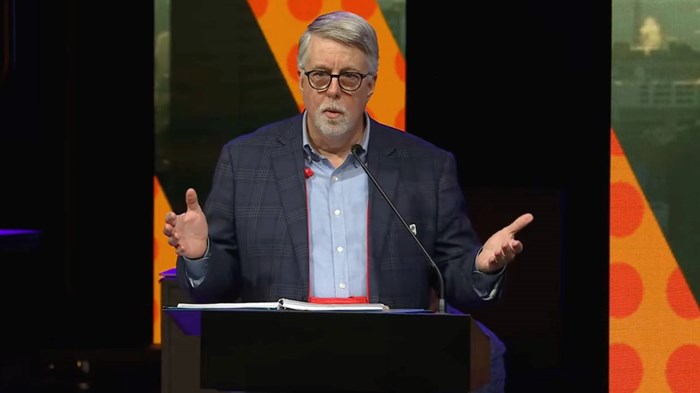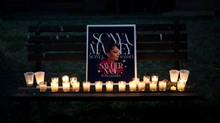
A Presbyterian denomination that prides itself on freedom in nonessentials has found its cooperative ministry model strained by the latest discussion of human sexuality.
Presbyterian historian Donald Fortson has been a member of the Evangelical Presbyterian Church (EPC) since its inception in 1981, and he says he has never seen a more “raucous” General Assembly than this year’s gathering, held last month in Memphis.
Among the topics of debate was whether to admit a congregation whose pastor identifies as homosexual but also says he is celibate and supports a traditional Christian sexual ethic, which falls under what some have called “Side B” Christianity.
Greg Johnson, pastor of Memorial Presbyterian Church in St. Louis, led his congregation to leave the Presbyterian Church in America (PCA) two years ago after that denomination had a preliminary vote to disqualify from ministerial office “men who describe themselves as homosexual, even those who describe themselves as homosexual and claim to practice celibacy by refraining from homosexual conduct.” (The denomination needed two-thirds of presbyteries to ratify that vote, which failed.)
Johnson has described himself that way, advocating Side B Christianity both at the controversial Revoice conference and in his book Still Time to Care: What We Can Learn from the Church’s Failed Attempt to Cure Homosexuality.
Now his church has inquired about joining the EPC.
“That has stirred up all kinds of controversy,” said Fortson, professor of church history and pastoral theology emeritus at Reformed Theological Seminary, “because we’ve got some in the EPC that appear to be very open to bringing him into the EPC, and we’ve got other groups that are absolutely opposed to him coming into the EPC.”
During its June 18–20 gathering, the EPC voted for a two-year study on “contemporary usage of the sexual self-conception and how such language comports with Scripture and the Westminster Standards.” All the denomination’s local presbyteries have been asked to pause consideration of matters related to the study while it is in progress. That means Johnson’s church would not be admitted until at least 2026.
Time will tell whether a denomination that has, for the sake of ministry cooperation, agreed to disagree on women’s ordination and charismatic practices can maintain the same posture on LGBTQ issues or if it will amend its constitution to address same-sex attracted clergy.
Unity in essentials
The EPC was founded more than four decades ago by a group of about 20 churches concerned with liberal drift in the Northern Presbyterian Church (then officially known as the United Presbyterian Church in the United States of America). Three points of concern for EPC founders were growing acceptance of homosexual ordination, questioning by some Northern Presbyterians of Jesus’ deity, and a push to force acceptance of female pastors.
The EPC’s attempted resolution of those concerns was a Presbyterian church where all leaders affirm a list of “essentials,” including the infallibility of Scripture, the deity of Christ, and the necessity of evangelism. The EPC also affirms the Westminster Confession of Faith, but in a looser way that acknowledges “that it contains the system of doctrine taught by the Bible” and allows ministers to disagree on some points.
Both complementarians and egalitarians are welcome in the EPC, as are Presbyterians with differing views on charismatic practices. A range of views on creation (from young-earth creationism to theistic evolution) and the Sabbath (from strict Sabbatarianism to a more permissive take on the Sabbath) also prevail in the EPC.
“The tension exists between those who may stress more the essential tenets of the EPC and those who may stress more the Westminster Confession in the EPC,” said EPC stated clerk Dean Weaver. Some EPC members “are Evangelical with a capital E and reformed with a small r, and there are some who are Reformed with a capital R and perhaps evangelical with a small e.”
So far, the arrangement has succeeded. By 2008, the EPC had grown to 77,794 members. Five years later, it jumped to 134,833. Last year, it reported 125,870 members, making it the third-largest Presbyterian denomination in America, behind the mainline Presbyterian Church (USA) with just over 1 million members and the more conservative PCA with nearly 400,000 members.
The EPC’s membership leveled off somewhat in recent years, dropping 15 percent since 2018. The leveling off was due in part, Weaver said, to “unhealthy” congregations that transferred in from the PCUSA between 2008 and 2018 and subsequently closed. Yet “modest growth post-COVID” has included a 7.4 percent increase in adult baptisms and a push for church planting.
Most EPC growth has come through churches transferring from the PCUSA.
“A lot of us are refugees from the PCUSA, including myself, and we have watched the PCUSA swing extremely liberal,” said Carolyn Poteet, lead pastor of Mt. Lebanon Evangelical Presbyterian Church in Pittsburgh.
But some growth has come from PCA congregations leaving over women’s roles in ministry.
Among those is Hope Evangelical Presbyterian Church in Columbus, Ohio. After a “discernment period,” Hope has opened deacon nominations to women. It has yet to decide whether it will permit female elders. Pastor Joe Haack says his congregation can thrive in a denomination with the EPC’s vision.
“We want the essentials. We want to have those nailed down,” Haack said. But “for the sake of mission, we think liberty in nonessentials is so key.”
Yet as the two-year study on human sexuality proceeds, EPC observers are asking whether the denomination will continue to agree on what constitutes a nonessential.
An uncertain future
During floor debate at the General Assembly, an Ohio pastor said the sexuality study will not help the EPC advance its agendas of unity or doctrinal fidelity.
“Although this compromise seems reasonable on its face, it’s not a real compromise,” said Joseph Yerger, pastor of Mansfield First Evangelical Presbyterian Church in Mansfield, Ohio. Consequences of approving the study committee “will include and must include, out of a false sense of fairness and charity, an active and positive consideration to support the possibility of the socially influenced, theologically erroneous position commonly called Side B Christianity, as promoted by the Revoice conference.”
An open letter written by Fortson and two EPC elders, Nate Atwood and Rufus Burton, takes a similar line. It argues people who “identify as homosexual,” even if they “claim to practice celibacy in that self-identification,” should be “disqualified from holding office” in the EPC.
In support of its position, the letter cites Scripture, the Westminster Standards, and “lessons from mainline Presbyterian history on the ordination of celibate homosexuals.” To date, more than 370 Evangelical Presbyterians have signed the letter.
Atwood calls the denomination’s discussion of homosexuality “doing theology in real time,” akin to Protestant Reformers like Martin Luther and John Calvin. He worries that permitting people who identify as homosexual to be ordained may unintentionally deny the Reformation doctrine of sola Scriptura, replacing the Bible’s call to repent of sinful desires with cultural accommodation.
“I agree with the critique of the conservative church that we have exhibited a kind of hostility to the LGBTQ community that has really hampered our witness,” said Atwood, pastor of St. Giles Presbyterian Church in Charlotte, North Carolina. “And I think there is some repenting to do with regard to our temperament and our attitude.” But “will we compromise the gospel,” which calls for repentance from sinful actions and “desires of the heart”?
Others say the EPC sexuality study is in keeping with the denomination’s vision. The compromise that led to the study committee was “a beautiful moment” and “what the EPC is all about,” said Poteet, chairman of the EPC committee that recommended the study. “Let’s figure out a way to be thoughtful and nuanced and submitted to Christ and submitted to Scripture and do this together.”
Evangelical Presbyterians agree that “sexual expression needs to be either celibacy outside of marriage or a marriage between a man and a woman,” she said. The question is whether a pastor can say of same-sex attraction, This is part of my experience, but I am living submitted to God.
Burton, stated clerk of the New River Presbytery in North Carolina, Virginia, and West Virginia, is optimistic about the study, even though he opposes ordination of celibate homosexuals.
He said during floor debate on the two-year study that it “is an answer to the prayers of the leadership team of the New River Presbytery.” It “will clarify our witness and bring our constitution and documents into greater conformity with the gospel.”
Still, it’s far from certain that studying Side B Christianity for two years will produce the desired result.
“I’ve been in the denomination for 10 years,” Poteet said, “and this is the closest I’ve seen it to not working. That was a little bit scary.”
David Roach is a freelance reporter for CT and pastor of Shiloh Baptist Church in Saraland, Alabama.
This article has been updated to correct the location of the New River Presbytery and clarify the PCA vote.

Support Our Work
Subscribe to CT for less than $4.25/month

















